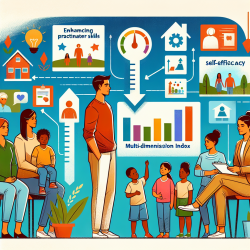Introduction
The COVID-19 pandemic has highlighted the critical role of social determinants in shaping health outcomes. A recent study, "Action on the social determinants for advancing health equity in the time of COVID-19: perspectives of actors engaged in a WHO Special Initiative," emphasizes the need for action on these determinants to achieve health equity. As practitioners in the field of speech-language pathology, understanding and integrating these findings can enhance the outcomes for children, particularly in online therapy settings like those provided by TinyEYE.
Understanding Social Determinants of Health
Social determinants of health are the conditions in which people are born, grow, live, work, and age. They include factors like socioeconomic status, education, neighborhood and physical environment, employment, and social support networks, as well as access to healthcare. These determinants are crucial in understanding health inequities and crafting interventions that are equitable and effective.
Key Findings from the WHO Special Initiative
The WHO Special Initiative highlighted several critical insights:
- Structural Determinants: These include policies, governance, and societal norms that shape the distribution of resources and opportunities. Addressing these can lead to long-term improvements in health equity.
- Intermediate Determinants: These involve direct factors such as access to healthcare, educational opportunities, and living conditions that impact individual health outcomes.
- Multisectoral Action: Collaboration across sectors is essential for addressing the complex nature of health inequities.
Applying These Insights to Speech-Language Pathology
As speech-language pathologists, integrating these insights can significantly enhance the effectiveness of our interventions, particularly in online therapy settings:
- Holistic Assessment: Consider the social determinants affecting a child's communication development. This includes understanding their home environment, parental involvement, and access to educational resources.
- Collaborative Approach: Work with educators, healthcare providers, and community organizations to address barriers to effective therapy. For instance, ensuring that families have access to necessary technology for online therapy sessions.
- Advocacy and Education: Educate families and communities about the importance of addressing social determinants. Advocate for policies that support equitable access to resources and opportunities for all children.
Encouraging Further Research and Action
While the WHO Special Initiative provides a robust framework, continuous research is vital. Practitioners should engage in ongoing learning and contribute to research efforts that explore the impact of social determinants on speech and language development. By doing so, we can develop more targeted interventions and advocate for systemic changes that benefit all children.
Conclusion
By understanding and acting on the social determinants of health, speech-language pathologists can play a crucial role in advancing health equity and improving outcomes for children. As we continue to navigate the challenges posed by the COVID-19 pandemic, let us commit to integrating these insights into our practice and advocating for a more equitable healthcare system.
To read the original research paper, please follow this link: Action on the social determinants for advancing health equity in the time of COVID-19: perspectives of actors engaged in a WHO Special Initiative.










